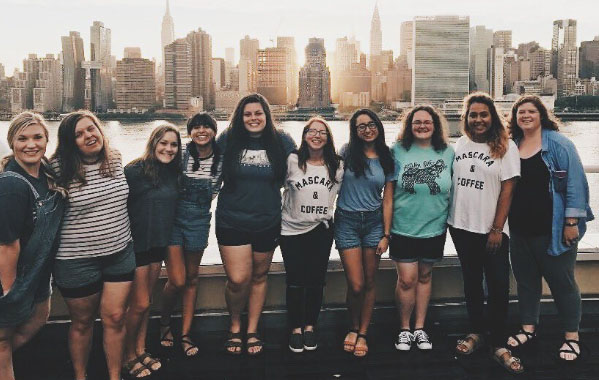By Josie Bingham
NEW ORLEANS—Emmy Reichart only lived in New Orleans, La., for six weeks. But that was all it would take for her heart to change.
Reichart was part of GenSend Summer—one of the North American Mission Board’s (NAMB) collegiate opportunities where students learn how to live missionally, engage culturally and love intentionally.
“My GenSend experience was like no mission trip I have ever been on before,” Reichart said. “This summer, I led a team of seven other students in the Irish Channel where we focused on doing ground research for a church plant starting in the coming weeks. We had two main focuses: developing dynamic relationships with locals and cultivating community.”
GenSend students work to plant churches, address homelessness, meet the needs of refugees, end human trafficking, rebuild communities affected by disasters and serve local churches.
In the district where Reichart and her team served, they had the opportunity to engage with local church planters across the city. This gave them an opportunity to get a glimpse into both the joys and hardships of church planting.
“No amount of preparation could have equipped me for what this summer would be like,” said Reichart. “I knew I would be going into an urban context where I would dive deeper into my understanding about living life on mission. I had the opportunity while doing GenSend to learn to love on broken people in the midst of realizing that different parts of my life were also broken.”
NAMB director of next generation mobilization, Steve Turner, described GenSend as a missionary development program leading to several possible next steps that worked within the students and the communities they served.
“GenSend is not a mission trip,” Turner said. “Instead, it is an immersion into living life on mission. Students live in community in the city, ride public transportation and serve alongside church planters and mercy and compassion ministries to experience what an everyday missionary’s life looks like.”
Every GenSend experience is different, yet the ultimate goal is to create a win for the students, cities, planters and churches or organizations who send the students.
For veteran participant, Emily Polak, her GenSend experience was in a neighborhood in Boston, Massachusetts known for its crime and gang activity.
“I knew I needed to be flexible,” Polak said. “In this part of Boston, there is discomfort with the Christian religion. Through GenSend, I have realized that we are all called to live on mission. I have acquired the skills to live this out. Now, I want to move to Boston.”
It was Brianna McKinney’s second year participating in GenSend’s Summer program.
“My GenSend sent me to live right off the red line near a metro stop in Washington, D.C.,” said McKinney. “I came into contact with people from all walks of life including high schoolers, individuals working on their doctorates, college students and homeless men and women. Every day was something different. We hosted a Thursday event called “”That Thursday Night Thing” where we made waffles and played board games. One week, we had over 80 people. I remember looking around and hearing at least five different languages being spoken at once. It was truly beautiful.”
Autumn Puckett was sent to Montréal, Québec in Canada—a city known for its millennial generation whose desire is to separate from their own country.
“Going into this trip, I knew I had to solely rely on God to get through the whole six weeks away from home,” Puckett said. “God broke my heart for the Québécois and spoke clearly to me about moving back with my future husband after a year of marriage was under our belts and school was done. I just felt God kind of whisper and say ‘Now you see this place like I do,’ and I knew I would never return home the same nor would I stop pursuing the Lord at work in Montréal.”
While GenSend students do a lot of the work themselves, coaches like Ryan Melson are there to guide students into learning the nuts and bolts of living, serving and planting a church in an urban context.
“We act as mentors, teaching students to think for themselves, solve problems and find ways to implement their required activities,” said Melson. “Part of my duties months in advance is coordinating with other planters, relief ministries and local support agencies to calendar out the GenSend Summer program. I also make sure the teams have what they need when they arrive.”
Melson served GenSend Summer students and church planters in New Orleans.
“GenSend is an immersive research project that will stretch the students in their faith and test them mentally, physically, emotionally and spiritually,” Melson added. “We train them so we can throw them in the deep end of the pool and teach them to swim! They will come away with a profound love for the city and the people who live here, their horizons broadened and with courage to go wherever God may lead them in the future.”
Turner agreed that GenSend was not just a summer camp or an internship but an experience aimed to change the hearts and lives of the next generation forever.
“We hope students take GenSend principles back home to their campuses, churches or communities,” said Turner. “We also hope they come back to their initial GenSend city short term or move back to leverage life in a non-ministry vocation. If GenSend students become planters or plant team members in the city, that’s also a win.”
In short, GenSend doesn’t end.
“GenSend is a catalyst for the rest of the journey,” Turner said. “Here students will learn what it’s truly like to be the hands and feet of Jesus. Then, they can take that knowledge and experience and put it into practice every day.”
To learn about upcoming GenSend opportunities, visit gensend.net.
Josie Bingham writes for the North American Mission Board.
Published August 15, 2017
